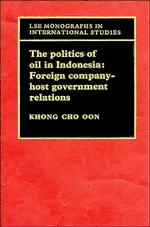Book contents
- Frontmatter
- Contents
- List of figures
- Acknowledgments
- 1 THE IMPACT OF THE FOREIGN COMPANY ON GOVERNMENT POLICIES IN LESS-DEVELOPED COUNTRIES
- 2 THE INDONESIAN PETROLEUM INDUSTRY: FORM AND CONTENT OF AGREEMENTS
- 3 FINANCIAL PROVISIONS AND CONSEQUENT AREAS OF DISPUTE
- 4 PROVISIONS FOR DEVELOPMENT AND NATIONAL CONTROL
- 5 PROBLEMS OF NEGOTIATION AND CONTRACTUAL CHANGE
- 6 ORGANISATIONAL STRUCTURE AND THE NEGOTIATING PROCESS
- 7 SOME REGIONAL CONSIDERATIONS FOR SOUTHEAST-ASIAN OIL-PRODUCER GOVERNMENTS
- 8 THE VIABILITY OF TRANSNATIONAL MINERAL AGREEMENTS
- Notes
- Select bibliography
- Index
3 - FINANCIAL PROVISIONS AND CONSEQUENT AREAS OF DISPUTE
Published online by Cambridge University Press: 05 November 2011
- Frontmatter
- Contents
- List of figures
- Acknowledgments
- 1 THE IMPACT OF THE FOREIGN COMPANY ON GOVERNMENT POLICIES IN LESS-DEVELOPED COUNTRIES
- 2 THE INDONESIAN PETROLEUM INDUSTRY: FORM AND CONTENT OF AGREEMENTS
- 3 FINANCIAL PROVISIONS AND CONSEQUENT AREAS OF DISPUTE
- 4 PROVISIONS FOR DEVELOPMENT AND NATIONAL CONTROL
- 5 PROBLEMS OF NEGOTIATION AND CONTRACTUAL CHANGE
- 6 ORGANISATIONAL STRUCTURE AND THE NEGOTIATING PROCESS
- 7 SOME REGIONAL CONSIDERATIONS FOR SOUTHEAST-ASIAN OIL-PRODUCER GOVERNMENTS
- 8 THE VIABILITY OF TRANSNATIONAL MINERAL AGREEMENTS
- Notes
- Select bibliography
- Index
Summary
FINANCIAL PROVISIONS GOVERNING PETROLEUM EXTRACTION
The problem of allocating financial benefits forms the focal point of the relationship between foreign company and host government. The various arrangements by which host governments seek to increase their revenue from company activities, and the practices employed by companies to defend their share of profits, are hence the subject of this chapter.
Whatever method is used to divide income, whether it be royalties, income taxation or production sharing, difficulties over allocation lie at the centre of all contract negotiations. The results of these methods, as indicated by the royalty or tax rates achieved or the division of production arrived at, were set out in the previous chapter. Yet behind these financial flows are various additional factors which have to be taken into consideration in determining the balance of financial advantage between company and government.
Indeed an assessment of relative bargaining power only from the actual outcome of the bargaining process, even though set out in the contracts agreed upon by both sides, can and almost certainly will prove to be, in effect, a misleading rather than an accurate indication of how financial profits and other benefits from the extractive operation are likely to be allocated. Actual rates alone cannot indicate the full picture of the allocation of financial benefits and risks, where the financial transactions involved attain such levels of complexity as are possible within the scope of a transnational relationship.
- Type
- Chapter
- Information
- The Politics of Oil in IndonesiaForeign Company-Host Government Relations, pp. 51 - 89Publisher: Cambridge University PressPrint publication year: 1986

